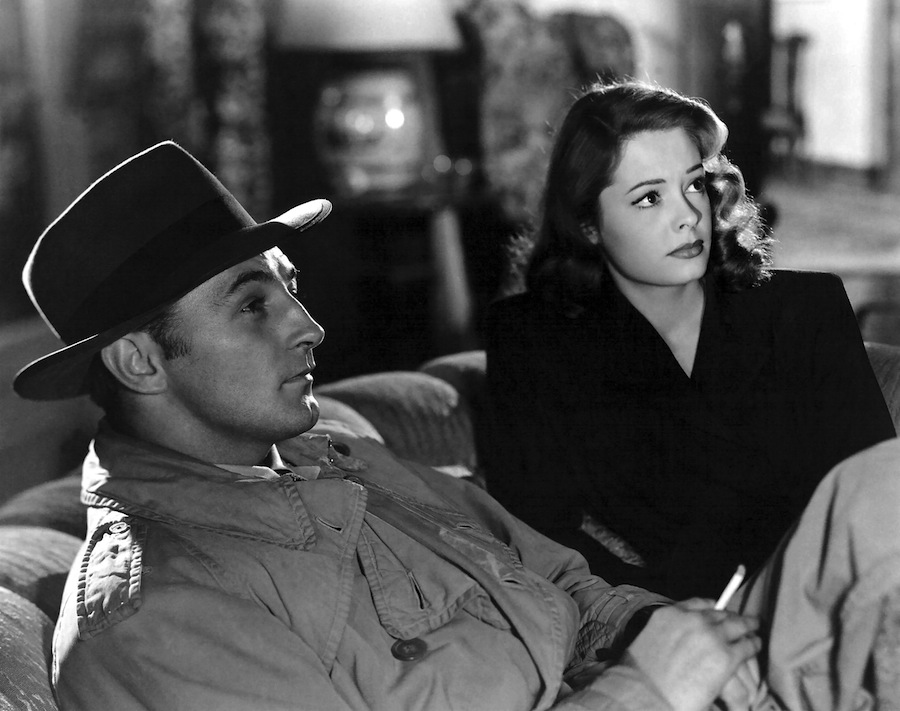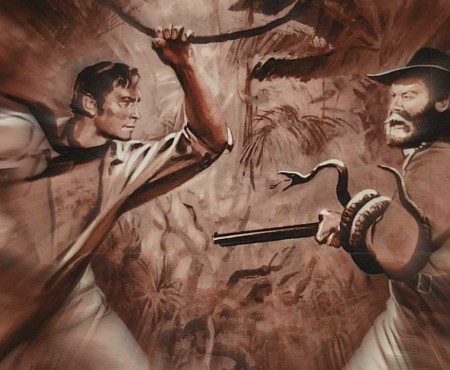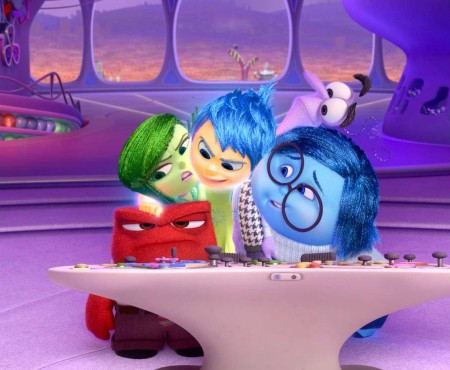Distributor: Warner Archive
Release Date: August 12, 2014
MSRP: $21.99
Order at Warner Archive (discs made to order)
Film: A / Video: A / Audio: B+ / Extras: C
Jacques Tourneur’s three films for Val Lewton—Cat People, The Leopard Man and I Walked with a Zombie—represented both a collective peak of B-movie form and a complete disposal of it in favor of something approaching profundity. They featured compositions so sharply defined and socially observant that their blatant expressionism nonetheless attained a degree of realism, while the content of each film blended cultural politics with outright mysticism. Tourneur’s Lewton films approach the notion of a spiritual void, which primed the director to tackle the moral ones of film noir.
Out of the Past puts forward a strong case for Tourneur’s kingship of that genre as much as his breakthrough films staked out his legacy in horror. From the first moments, in which a mysterious man arrives in a small town and gives a sideways look of apprehension and loathing at an oblivious cop car driving by in the distance, the film operates on a mood of barely restrained fury. Even the relatively romantic introduction of the sought-after Jeff Bailey immediately plays on the imposing, storied presence of star Robert Mitchum. Mitchum was an actor who always suggested a deep, perilous past, and the suddenness with which he is abruptly put on-screen is almost shocking for how instantaneously Mitchum’s mere appearance forces one to contend with skeletons that don’t seem to be in Jeff’s closet so much as hanging around his neck.
Cavorting lakeside with girlfriend Ann (Virginia Huston), Jeff suggests a history of violence in his stiff movements and in the rough experiences coded into Mitchum’s growl. Jeff talks of settling down with Ann, but there’s a stilted dispassion in his voice, not a result of bad acting but several layers of buried truth, a willful self-repression in action as he looks to emulate what normal people do. It’s a measure to try and prevent something from catching up to him, which it of course does, forcing Jeff to recount his past life as a private eye who took the wrong job.
Much of the film unfolds in flashback, yet Tourneur and writer Daniel Mainwaring manage to obscure rather than illuminate. Dispatched to find a runaway woman named Kathie (Jane Greer) by her vengeful lover, Whit (Kirk Douglas), Jeff quickly finds her, but that’s as simple as things ever get. Jeff and Kathie regard each other with instant understanding; she knows from the first sight why he’s in her life, and even as Kathie gradually reveals depths of fatale scheming, Jeff seems less surprised than dismayed to see this side of her, as if he anticipated it but hoped he could keep it contained.
The remainder of the film, in which Jeff must contend with Kathie’s machinations and Whit’s fury, adds complication after complication, yet the pile-on of reversals and betrayal does not add any more clutter to the frame. As Roger Ebert noted about the film, lighting in the film is directed less on characters than on the space between them, not only to catch their chimney-stack cigarette smoke but all the evocative distance that exists between the characters. Several people die in the film, but it is this hanging space that feels most traumatizing and disruptive, the entire world around the characters bent toward their amoral solipsism and willingness to die just so long as they can prevent anyone else from getting out ahead of them. As Chris Fujiwara has written, Tourneur’s method is not an “absence of style” but “a style that emphasizes absence,” and it is that total control of physical and moral absence that makes Out of the Past one of the quintessential works in a genre riddled with decay.
A/V
Warner Archive’s transfers are always hit and miss, though their remastered line (featuring such beauties as Two Weeks in Another Town, Party Girl and Tourneur’s own Stars in My Crown) often boasts gorgeous video. But nothing compares to the work done on this disc; only a faint flicker (which in and of itself has pleasingly nostalgic tones) stands out from an otherwise pristine disc. Tourneur’s crisp black-and-white films deserve this treatment, preserving the plunging depths of his use of high-contrast monochrome, the intensely textured faces, and the easily missed details that rely on visual clarity for their full impact. Sound is also spotless, with a solid mono track that stresses silence as much as dialogue.
Extras
Warner Archive’s lone feature is a commentary track from film noir expert James Ursini, who provides an able overview of the film and of noir conventions in general. There’s not much revelatory information or analysis for dedicated genre fans, but as a condensed history lesson, it’s worthwhile.
Overall
An essential film noir gets an equally strong release from Warner Archive, hopefully pointing the way for future releases of a similar quality.




















